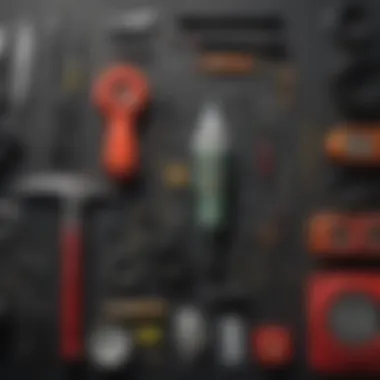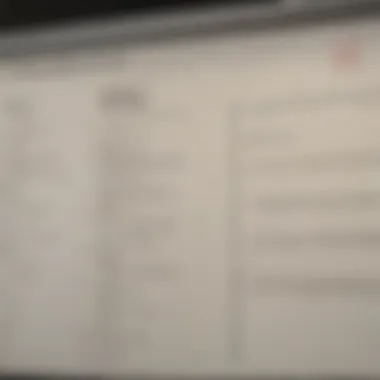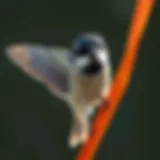Pest Control Interview Questions: A Comprehensive Guide


Intro
Effective pest control relies heavily on understanding the nuances of pests, their behaviors, and the methodologies for management. This guide aims to illuminate the essential interview questions that both employers and candidates should prioritize in the pest control industry. With detailed insights into technical knowledge and professional conduct, this resource seeks to elevate the standards of hiring practices and professional development in pest management.
Understanding Pests
Pests are organisms that damage crops, structures, or human health. Understanding the definition of pests is critical for effective pest control. They can be classified into various categories, such as insects, rodents, and microorganisms.
Definition of Pests
Pests broadly refer to any species that is deemed harmful or troublesome. For example, cockroaches, termites, and rats fall under this category. Knowledge of different pests is fundamental for identifying the best management practices.
Importance of Pest Identification
Accurate pest identification is crucial for a few reasons:
- It helps in choosing the right control method.
- It reduces unnecessary chemical use, thereby protecting the environment.
- Knowing the life cycle of specific pests can lead to more effective preventive measures.
"An accurate pest check can save both time and resources for homeowners."
Prevention Techniques
Prevention is the frontline of effective pest control. By implementing preventative measures, homeowners can create environments that discourage pests from establishing themselves.
Home and Garden Preventative Measures
- Sealing Entry Points: Inspect homes for cracks and gaps where pests can enter. Use weather stripping or caulking to seal these points.
- Proper Waste Management: Ensure garbage bins are tightly sealed and cleaned regularly to deter pests.
- Regular Landscaping Maintenance: Trim plants and trees regularly to prevent pest habitats close to the home.
Seasonal Prevention Tips
Different seasons bring different pest challenges. Here are helpful tips:
- Spring: Focus on removing clutter from yards and gardens, as pests begin to emerge.
- Summer: Ensure that screens on windows and vents are intact to prevent entry.
- Fall: Seal exterior cracks and prepare gardens for winter to deter overwintering pests.
- Winter: Keep homes warm, but ensure safe ventilation to avoid moisture that attracts pests.
Eco-Friendly Pest Control Solutions
With rising awareness of environmental issues, many homeowners are looking for sustainable pest control options.
Overview of Sustainable Practices
Employing eco-friendly pest control practices can be beneficial. These methods often include:
- Integrated Pest Management (IPM): A holistic approach combining biological, physical, and chemical strategies.
- Organic Solutions: Utilizing naturally derived pesticides or attracting beneficial insects that prey on harmful pests.
Natural Remedies and Their Effectiveness
Natural remedies can provide effective solutions while minimizing chemical exposure. Some common remedies include:
- Diatomaceous Earth: An effective means to control insects like ants and cockroaches.
- Vinegar: Acts as a natural repellent for certain pests.
- Essential Oils: Oils such as peppermint or eucalyptus can deter pests when used in diluted forms.
In summary, understanding pests and applying effective pest control measures is crucial for homeowners. By using eco-friendly practices and prevention techniques, individuals can manage pests efficiently and responsibly.
Understanding the Pest Control Industry
To begin an exploration of pest control interviews, it is vital to comprehend the foundational aspects of the industry itself. Understanding the Pest Control Industry is more than just knowing how to handle rodents or insects; it encompasses a suite of knowledge about the methods, ethics, and regulations that guide professionals in this field. Candidates who grasp these concepts will be better prepared for interviews and ultimately success in their careers.
Overview of Pest Control
Pest control involves the management of various pests that interfere with human activities. This includes household pests like ants, termites, and cockroaches, as well as agricultural pests that can affect food production. Approaching pest control requires knowledge of pest biology, behavior, and effective treatment methods. The industry has evolved significantly with advancements in technology and a growing focus on environmentally friendly solutions.
There are different types of pest control strategies, including chemical, biological, and physical methods. Chemical methods often rely on pesticides, while biological methods utilize natural predator species to control pest populations. Physical methods include traps and barriers. A competent pest control professional must be familiar with these approaches and choose the most suitable one based on the situation at hand.
Significance of Effective Pest Management
Effective pest management is critical not only for maintaining a pest-free environment but also for protecting public health. Pests can transmit diseases, cause property damage, and diminish the quality of life. Consequently, pest control professionals play a central role in safeguarding homes and communities.
Moreover, effective pest management contributes to sustainability. The use of integrated pest management (IPM) strategies helps minimize the use of harmful chemicals and promotes ecological balance.
In interviews, candidates must be prepared to demonstrate their understanding of pest management’s significance. This may involve discussing how they would balance effectiveness with safety, as well as how they prioritize customer satisfaction while addressing pest issues.


"Effective pest management is not just about eradication; it's about creating a safe and healthy environment for all."
Thus, having a comprehensive understanding of the pest control industry allows candidates to approach interviews with confidence, showcasing both their technical knowledge and their commitment to best practices in pest management.
Types of Pest Control Professionals
Understanding the various types of pest control professionals is crucial for both employers and job seekers in the industry. Each role has distinct responsibilities, skills, and knowledge bases that determine their effectiveness in pest management. This section of the article addresses the differences and synergies between these roles, and why these distinctions matter. Knowing the specific functions and expertise required will aid in crafting targeted interview questions that align with job requirements.
Exterminators vs. Pest Management Professionals
The terms exterminator and pest management professional are often used interchangeably; however, they represent different scopes of work. An exterminator specifically focuses on eradicating pests using chemical treatments or other means. Their role typically emphasizes immediate results in eliminating infestations.
On the other hand, pest management professionals adopt a more holistic approach. They not only handle pest eradication but also emphasize prevention and control strategies. This involves assessing environmental factors, understanding pest biology, and implementing Integrated Pest Management (IPM) procedures. The key distinction lies in their strategies—exterminators provide short-term solutions, while pest management professionals aim for long-term pest control.
When interviewing candidates, understanding this difference helps in assessing their approach to pest management. Questions can probe their knowledge of IPM, familiarity with pest species, and comfort level with chemical versus organic solutions.
Specialized Roles in Pest Control
Within the pest control sector, various specialized roles exist, each tailored to address particular challenges. For instance, wildlife control specialists are trained to handle specific animal infestations that require a different set of tactics compared to insect or rodent control. Similarly, termite control experts possess in-depth knowledge about prevention and treatment options for termite infestations, which can cause significant structural damage.
Other roles may include technicians who focus on specific pest sectors like bed bugs, ants, or cockroaches. Each specialization requires unique certifications and training. Understanding these divisions can help in tailoring interview questions that assess the applicant's expertise in relevant areas.
Recognizing the importance of specialized roles also aids in aligning expectations for job functions. Employers should clearly define the particular needs of their operation to ensure that candidates possess the required skill sets.
Preparing for the Interview
Preparing for a pest control interview is a crucial step for both interviewers and candidates. This phase sets the tone for the entire hiring process. A well-prepared candidate can effectively convey their suitability for the role, while hiring managers can ensure they identify the most qualified individuals.
The importance of understanding job requirements cannot be overstated. Candidates must have a clear grasp of what the position entails. This includes recognizing the specific duties and skills expected from them. Those who have done their homework on the job description will likely perform better in the interview. They will be able to tailor their responses to match the employer's needs, demonstrating not only their knowledge but also their enthusiasm for the role.
Moreover, researching the company offers numerous benefits. It helps candidates gain insights into the organization's culture, values, and pest control methodologies. Understanding a company's approach to pest management will allow candidates to speak more knowledgeably about how they align with those practices. For interviewers, this knowledge can help gauge if a candidate is a good fit for the team. It encourages a two-way dialogue about how one can contribute to the company’s goals.
In sum, preparing for the interview is about more than just answering questions. It's about building a connection that shows both parties are invested in a mutually beneficial relationship. As a result, taking time to prepare thoroughly can greatly impact the outcome for candidates and interviewers alike.
Understanding Job Requirements
Job requirements outline the key responsibilities and qualifications necessary for a successful pest control professional. Familiarity with these requirements helps candidates identify the skills they might need to develop. Typically, these may include expertise in pest identification, knowledge of various extermination techniques, and familiarity with safety protocols. By understanding these aspects, candidates can prepare relevant examples or stories to illustrate their proficiency.
Hiring managers, on the other hand, benefit from clearly defined job requirements, which enable them to assess each candidate's capabilities more effectively. This clarity helps streamline the interview process, making it more efficient.
Researching the Company
Researching the company is an essential part of interview preparation. This includes delving into its history, mission, and the services it offers. Utilizing resources like Wikipedia, Britannica, or even social media platforms such as Facebook can provide significant insights.
Candidates should learn about the company's reputation in the pest control industry, its approach to pest management, and any recent news or innovations. This kind of knowledge not only demonstrates an interest in the employer but also shows that the candidate has taken initiative. Additionally, it informs candidates about potential questions they may have about the organization, which can further enhance the conversation during the interview.
In summary, thorough preparation focusing on job requirements and company research lays a strong foundation for a successful interview process.
Key Technical Interview Questions
In the pest control industry, technical knowledge serves as the cornerstone of effective pest management. For employers, questions focused on technical skills during the interview process can filter out candidates who may lack essential expertise. These inquiries cover a range of topics, from pest identification to safety protocols. Each question can reveal a candidate's experience, understanding, and capability to handle real-world scenarios. Moreover, these technical questions help candidates demonstrate their problem-solving abilities and knowledge of industry standards.
Common Pest Identification Techniques
Identifying pests accurately is crucial for success in pest control. Job candidates should be familiar with various species and their habits. During an interview, asking about common pest identification techniques can uncover how well candidates know the field. They can mention visual signs like droppings or nests, or the use of specific tools like magnifying glasses and pest identification guides. Their ability to quickly identify a problem can significantly impact the effectiveness of treatments.
Understanding Chemical and Organic Solutions
Knowledge of pest control solutions is another vital area. Candidates should comprehend both chemical and organic options. An interviewer may ask about specific products, their applications, and their efficacy. Candidates should be able to discuss the advantages of organic methods or Integrated Pest Management Protocols. Understanding the balance between efficacy and environmental impact is key.
Safety Protocols and Regulations
Safety cannot be overlooked. Interviewing candidates about safety protocols can highlight their awareness of regulations. Questions may cover handling hazardous materials, wearing protective equipment, or understanding local regulations regarding pest control. A solid understanding ensures that both the employees and clients are safe, and it also minimizes liability for the company.
Integrated Pest Management Strategies
Integrated Pest Management, or IPM, represents a holistic approach in pest control. It combines various strategies to reduce pest problems while minimizing risks to people and the environment. Candidates should articulate their familiarity with IPM techniques. Ask them to describe the steps involved, such as monitoring pest populations and incorporating preventive measures. Effective understanding shows a proactive mindset and emphasizes a comprehensive approach to pest control.
Key technical questions during interviews can help ensure that candidates hold the necessary skills, knowledge, and judgment to face the challenges in the pest control industry. By focusing on these aspects, companies can enhance their workforce and promote more effective pest management.


Behavioral Interview Questions
Behavioral interview questions are crucial in the pest control industry as they help assess a candidate's interpersonal skills and approach to real-world situations. Employers need to understand how potential hires respond to various challenges, especially in a customer-focused field like pest management. These questions often reveal more about a candidate's personality and problem-solving abilities than technical knowledge alone. The emphasis on such questions can drastically improve the quality of hires by highlighting those who can maintain professional decorum even in stressful situations.
Handling Difficult Customers
In pest control, dealing with difficult customers is an inevitable part of the job. Candidates must demonstrate strong communication skills and emotional intelligence when faced with frustrated homeowners. A significant aspect of pest management is not just solving the issue but doing so while ensuring customer satisfaction.
When posing questions about handling difficult customers, interviewers should look for specific examples from past experiences. Did the candidate acknowledge the customer's concerns? Did they propose clear solutions and communicate effectively?
Benefits of this skill include:
- Increased customer retention
- Positive word-of-mouth advertising
- Improved company reputation
It's vital to nota that candidates should also provide solutions tailored to individual cases, showing flexibility and customer-centric thinking. This ability reflects a deeper understanding of the pest management business.
Teamwork in Pest Control Operations
Teamwork is essential in pest control operations, especially for those working in a collaborative setting. This can involve teams of technicians coordinating on job sites, as well as working alongside administrative staff. Successful pest management often requires input and support from various team members.
Interviewers should ask about experiences where candidates worked as part of a team. Effective responses should highlight the ways they contributed to group goals and navigated interpersonal challenges. Understanding the dynamics of teamwork in pest control fosters a harmonious workplace where knowledge and skills are shared.
Considerations for evaluating teamwork skills include:
- Ability to compromise and collaborate
- Communication style with peers
- Conflict resolution strategies
It is also significant to consider how a candidate can help enforce safety protocols while collaboratively achieving project goals. Strong teamwork not only enhances efficiency but also encourages a safer work environment.
"Effective communication and strong teamwork are fundamental in creating a resilient pest control operation that meets customers' needs swiftly and effectively."
Situational Questions in Pest Control Interviews
Situational questions are critical in pest control interviews as they help to gauge a candidate’s problem-solving abilities and adaptability to real-world scenarios. These questions allow interviewers to understand how candidates approach specific challenges in pest control, which can vary greatly depending on the situation. The pest control profession often involves unpredictable environments that can present unique challenges. Therefore, the ability to think on one’s feet is essential.
Such questions often include role-play scenarios or hypothetical situations that pests may present. By utilizing these questions, interviewers can assess not only technical skills but also how well candidates can handle stress and unexpected outcomes. Candidates are given the chance to demonstrate their critical thinking skills and how they prioritize different tasks and decisions.
Dealing with Unexpected Pest Infestations
When interviewers ask about unexpected pest infestations, it tests a candidate’s immediate reaction and operational strategy. Candidates might be asked to describe a time they encountered a surprise infestation and how they managed it. This not only reveals their past experiences but also reveals their thought processes in stressful situations.
Responses should highlight:
- Assessment of the Situation: How quickly can they identify the type of pest?
- Action Taken: What steps did they take immediately?
- Communication Skills: How did they inform the client about the issue?
- Follow-Up: What strategies were put in place to prevent future infestations?
This level of detail is key. It shows their analytical mindset, customer service skills, and proactive approach to pest management.
Evaluating Job Sites for Efficiency
Evaluating job sites for efficiency is another significant situational question. Candidates might be asked how they would assess a property to determine the most effective pest control solutions. This type of question allows candidates to demonstrate their understanding of pest behavior, the environment, and various treatment options.
Key considerations candidates should mention include:
- Inspection Techniques: What methods do they use for inspecting properties effectively?
- Resourcefulness: How do they determine the tools and products needed for the job?
- Time Management: How do they prioritize tasks on-site?
- Documentation: Importance of keeping accurate records during evaluations.
Such responses provide insight into a candidate's organizational skills and ability to work efficiently under potentially chaotic circumstances.
The effectiveness of pest control requires not only technical knowledge but also a practical understanding of situational dynamics.
Evaluating Candidate Responses
Evaluating candidate responses in the pest control interview process is critical. This assessment goes beyond simple right-or-wrong answers. It provides insights into the applicant's knowledge, experience, and practical application of pest management principles. This section looks at two key areas: assessing technical knowledge and understanding behavioral indicators. Each aspect plays a vital role in determining a candidate's suitability for the job.
Assessing Technical Knowledge
Assessing a candidate's technical knowledge is fundamental in pest control hiring. This assessment reveals their familiarity with specific pest species, control methods, and safety regulations. When candidates answer questions related to pest identification or control techniques, interviewers should look for clarity and depth in their explanations.
For instance, a strong candidate should accurately identify common pests like termites, bed bugs, or rodents. They should also be able to articulate effective strategies for managing these pests which might include chemical treatments or integrated approaches. Candidates who can cite relevant procedures for safe pesticide application demonstrate a heightened level of expertise and responsibility.
Overall, this evaluation helps employers gauge if a candidate has the necessary skills for the position. Moreover, it allows interviewers to identify potential training needs for less experienced candidates.


Understanding Behavioral Indicators
Beyond technical skills, understanding behavioral indicators is also essential when evaluating candidates. This involves assessing how individuals have responded to previous situations related to pest control. Questions that allow candidates to share past experiences can reveal crucial insights into their problem-solving skills and interpersonal abilities.
For example, an interviewer might ask how a candidate handled a difficult customer complaint about a pest problem. Responses indicating patience, clear communication, and conflict resolution skills demonstrate an ability to manage customer expectations effectively. This competency is particularly important in an industry that is often reactive and customer-focused.
Furthermore, behavioral indicators can inform future actions. Candidates who show adaptability and willingness to learn signal to employers a dedication to the profession and a potential for growth. By utilizing this approach, interviewers can select candidates who are not only qualified but also align well with the company culture and values.
Post-Interview Considerations
Post-interview considerations play a crucial role in finalizing the hiring process for pest control positions. After interviews, both interviewers and candidates need to reflect on the insights gained during the discussions. Evaluating these insights helps organizations make informed decisions. Moreover, providing feedback fosters growth and improves the overall recruitment process.
Providing Feedback to Candidates
Providing feedback to candidates is vital for multiple reasons. First, it reinforces the interview experience. Candidates benefit from knowing where they excelled and where they might improve. This knowledge can enhance their future interview performance.
Interviewers should aim to be constructive in their feedback. Indicate specific strengths, such as effective communication or strong problem-solving skills. On the other hand, if a candidate struggled with technical questions, this should be addressed respectfully. For instance, rather than just stating, "You lacked pesticide knowledge," one might say, "Consider reviewing the latest pest control methods as they are crucial in our industry."
Additionally, timely feedback is essential. Candidates appreciate knowing their standing, especially if they invested significant time preparing for the interview. Prompt communication can foster goodwill toward the company, which might influence the candidate's decision to apply for future roles or recommend the organization to others.
Making the Final Hiring Decision
Making the final hiring decision requires careful consideration of various factors. Interviewers should reflect on each candidate's technical expertise, behavioral responses, and how well they align with the company's core values. It is also wise to consult within the hiring team. Collaborating with fellow interviewers may uncover differing perspectives and lead to a more rounded decision.
One method to facilitate decision-making is using a scoring system. Interviewers can rate candidates based on key competencies identified during the interviews. Such metrics provide a clear visual of how each candidate measures against others.
Beyond qualifications, factors like cultural fit and the potential for long-term development should not be underestimated. Candidates who demonstrate adaptability and eagerness to learn may be more beneficial in the long run, even if their current experience is not as robust as other applicants.
Ultimately, the decision should reflect a balance between skillset and alignment with the company's mission and vision. A well-thought-out hiring process can significantly enhance the efficiency and reputation of the pest control firm in the competitive market.
Continuing Education and Training
Continuing education and training play a crucial role in the pest control industry, as they allow professionals to stay current with the evolving challenges they face. This field is not static; it frequently undergoes changes due to advancements in technology, environmental regulations, and pest behavior. Therefore, a commitment to ongoing learning is vital for both individual career growth and the overall effectiveness of pest management practices.
Importance of Certifications
Certifications serve as benchmarks for pest control professionals, illustrating their knowledge and commitment to excellence. Obtaining a certification from a recognized body, such as the National Pest Management Association or state-specific agencies, can significantly enhance a professional's credibility.
These credentials often require a combination of coursework and passing an examination. This not only provides technicians with a solid foundation of pest management principles but also instills confidence in clients. For home and property owners, the certification of a pest control operator indicates that they are dealing with a qualified and knowledgeable expert.
Additionally, certification often opens doors to additional training opportunities, networking within the industry, and even career advancement. Professionals who hold valid certifications may also find themselves more favorable among employers during the hiring process.
Staying Updated with Industry Innovations
The pest control industry is continuously changing with the introduction of new methods, tools, and technologies to tackle infestations. Professionals must make a conscious effort to stay updated with these advancements to provide effective solutions. Continuing education programs often include workshops, webinars, and conferences where the latest developments are discussed.
Engaging with online resources, such as forums and industry websites, like reddit.com, can also provide insights into innovations being adopted by peers. Understanding emerging trends, such as eco-friendly pest control products and integrated pest management techniques, allows pest control professionals to deliver modern and sustainable solutions.
Moreover, awareness of legislative changes is critical. New regulations can affect the approval of certain chemicals or practices. Training programs that emphasize regulatory updates are invaluable in keeping pest control professionals well-informed.
Continuous education enhances skills and knowledge, ensuring that pest control professionals remain competitive in a dynamic industry.
The Future of Pest Control Careers
The pest control industry is evolving, influenced by changes in technology, environmental policy, and consumer expectations. Understanding the future of pest control careers is crucial for both aspiring professionals and companies planning for long-term success. Today's job seekers must cultivate relevant skills and adaptability to stay ahead.
This future includes the integration of advanced technologies like drones and smart traps, enhancing both effectiveness and efficiency. Candidates with a solid grasp of these innovations will have a competitive edge. Furthermore, societal awareness about health and environmental concerns leads to a significant shift towards sustainable practices. Thus, interview questions will increasingly focus on a candidate's understanding of ecological impact and sustainable methods.
Emerging Trends in Pest Management
As the industry shifts, several important trends emerge. One significant trend is increased use of data analytics. Pest control companies are now leveraging software that analyzes pest trends based on seasonality, location, and historical data. This allows for targeted applications of pest control measures, reducing waste and improving efficiency.
Another emerging trend involves the adoption of Integrated Pest Management (IPM) practices. IPM principles focus on long-term prevention and control strategies that minimize risks to people and the environment. Prospective employees should be familiar with IPM approaches, as companies prioritize those who can implement sustainable solutions.
Also notable is the growing demand for organic pest control methods. More homeowners seek eco-friendly solutions that ensure safety for their families and pets. In job interviews, candidates may face questions about competency in organic alternatives and their effectiveness.
The adoption of advanced technology and sustainable practices is redefining the pest control landscape.
Sustainability in Pest Control Practices
Sustainability has transitioned from being a mere buzzword to a significant component of pest control practices. As consumers become more eco-conscious, pest control professionals must prioritize sustainable strategies. This shift not only benefits the planet but also enhances a business's reputation with environmentally-aware clients.
A few sustainable practices include:
- Biological control: Utilizing natural predators or pathogens to manage pest populations.
- Cultural control: Modifying practices such as crop rotation or sanitation to eliminate pest habitats.
- Reduced use of chemicals: Implementing targeted treatments that focus on specific pests to avoid over-application of harmful substances.
Candidates should showcase knowledge of sustainable practices and be prepared to discuss how they can integrate these approaches into their work. Job seekers should emphasize their commitment to eco-friendly pest management methods during interviews, as this aligns with the industry's progressive shift.



